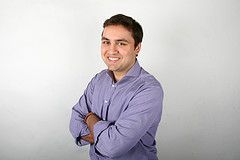British Divided Over Religion’s Role in Public Life: Q+A with Amar Bakshi
Amar Bakshi has what for many people would be a dream job: the 23-year-old recent college graduate travels the world, capturing the thoughts of ordinary and not-so-ordinary people in word and image. Bakshi’s text and video blog, “How The World Sees America,” appears on Washington.Post.Newsweek.Interactive’s foreign affairs blog, Post Global. This summer, Bakshi traveled to England, Pakistan and India. He’s briefly back in his hometown of Washington D.C. before heading off to the Middle East, South East Asia and Latin America in October.
ReligionWriter caught up with Bakshi this week to ask him what role religion plays in perceptions of America and how he manages his own “ambiguous” religious identity while traveling. Part One of the interview appears today; Part Two will appear on Monday.
ReligionWriter: How did you manage to create this assignment for yourself?

At the time I was still wrestling with my experience in
RW: When people overseas look at America, do they perceive it as a religious nation?
Bakshi: I’d have to say no. Religiosity in the
RW: So when people overseas think of America in religious terms, they only think of the religious right?
Bakshi: Yes, but there is also a good sense of the religious diversity that
RW: We hear that Europeans tend to see Americans as crazed religious fanatics. Did you get that sense from the British people you met?
Bakshi: In England I heard again and again a feeling of surprise at how overtly patriotic and outspokenly religious Americans seem to be. The two ideas were often conflated, especially when it comes to perceptions of U.S. foreign policy. But in England at least, people spoke with some nuance about different aspects of American religious life, rather than lumping everyone together.
RW: England is known for being much less religious than America; we hear about Anglican churches with only a handful of elderly ladies in the pews. Did you find that to be true?
Bakshi: Public display in general is much more of an American characteristic than a British one, and this applies both to patriotism and religion.
There’s a sense around England, “If only we were less demonstrative of our beliefs, the better we could all fit into this polity.” When Jack Straw, the home minister, asked a woman to remove her face veil, there was a huge uproar, but his point was wanting to lessen those differences in public as much as possible.
RW: I have heard that British Muslims are more outwardly traditional-looking than American Muslims — that you’re more likely to see women with face veils or South Asian men in salwar khameez for example. Did you find that to be true?
Bakshi: It’s one of the first things I noticed when I got to Walthamstow or Blackburn. You walk down the street and there are bearded guys everywhere; you could be on a street in Lahore or Malegaon in India. But at the same time, there are a tremendous number of British Muslims who look just like I do, and I’m not terribly religious at all. So it’s easy to get fixated on those strong outward displays of identity.
In Blackburn, what I heard is this: outward displays help to bind together a community that felt itself under seige; identifying marks help them remember what they are fighting for. Of course everyone has a different explanation of what that is.
RW: And why exactly do British Muslims feel under siege?
Bakshi: The grievances of most were largely not religious but civil liberties-oriented grievances. I heard again and again the idea that “our friends are getting jailed, we’re scared, we don’t have jobs, there’s crime.” It wasn’t “the West is too liberal” or “Christianity is at war with Islam.” Of course there is a small minority of extremists that do hold those views, but they are not held by anywhere near a majority of British Muslims.
RW: Do you think emphasizing America’s religiosity is a way to build bridges with Muslims or others worldwide who would otherwise be anti-American?
Bakshi: Absolutely. In
On the other hand, the people who don’t want religion in public life, who think religious displays should be tamed down, for them America’s religious center is not really seen as an ally. It’s seen as a problem of religion growing into the public sphere. In England in particular, I heard the sentiment that religious expression needs to be reigned in.
Coming Monday: Bakshi offers explanations of why Osama bin Laden is more popular than President Musharraf in Pakistan, and how his own fluid religious identity has impacted his reporting.

Comment by Joshua Udell on 19 September 2007:
Bakshi “I’m against the American government, and I’m for the American people.”
I am glad to hear part of those words from you, but it is the American people who put the government into place.
So I must say, either we are not as wise as you think or the government we place in by our voting process is indeed a waist of time, which I think is not the case.
The people are responsible who is in our nation’s government making us responsible for the reason you are against the American government.
The citizens of America that you are for are the very people who voted many of the knuckle heads into office.